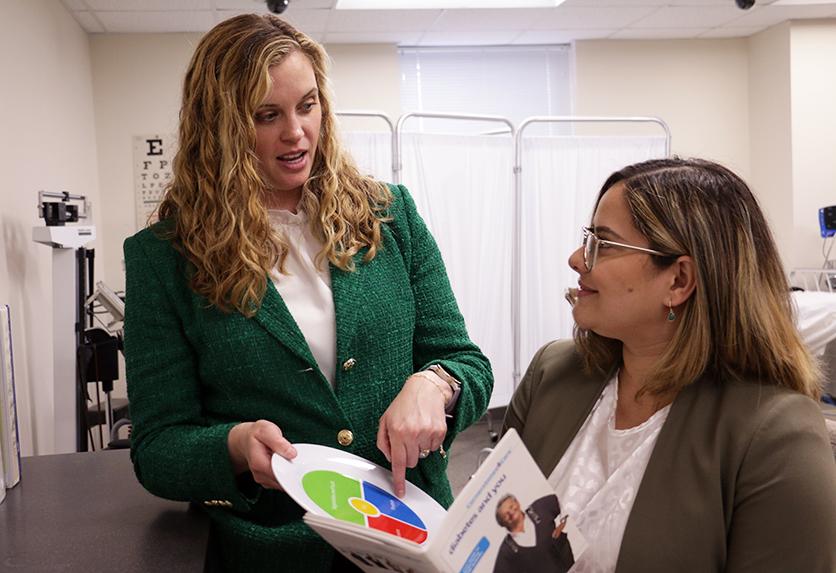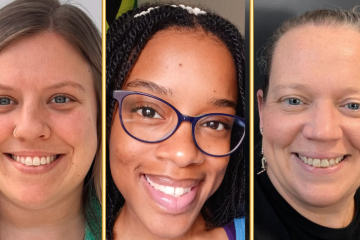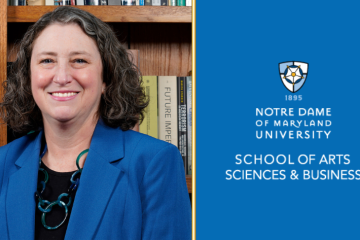School of Pharmacy Increases Diabetes Education Access Through State Grants

By: Erik Pedersen, Senior Communications Manager
BALTIMORE – The number of people diagnosed with diabetes has increased across the globe in recent years, and Maryland has not been immune to the trend.
Recent research by the state’s Behavioral Risk Factor Surveillance System estimates that over 10 percent of Maryland adults have diabetes, and an additional 30-plus percent are diagnosed with prediabetes. With a mortality rate of 20.5 per 100,000 in 2019, diabetes is the sixth leading cause of death in Maryland.
Reducing those numbers is a priority for the state, and Notre Dame of Maryland University’s School of Pharmacy has emerged as a leader in that effort after being awarded a pair of grants to implement Diabetes Self-Management Education and Support (DSMES) Umbrella Hubs across the region.
The grants, distributed by the Maryland Department of Health, totaled a combined $96,000. The first involved NDMU working with local pharmacies to get them accredited and set up to educate patients about their diabetes using the School of Pharmacy’s curriculum. Dr. Ashley Moody, assistant professor of clinical & administrative sciences, and Dr. Matthew Shimoda, associate dean for student affairs and associate professor of clinical & administrative sciences, were both involved in that process under the leadership of Dr. Anne Lin, dean of the School of Pharmacy.
“The ultimate goal is to enhance the ability of pharmacies and pharmacists to provide diabetic education services to their populations effectively and efficiently,” Dr. Shimoda said. “Accreditation allows pharmacies to bill Medicare and insurance companies for these services, but it’s not an easy process. There were a lot of logistical issues we had to work through.”
“The public may not know this, but pharmacies and especially community pharmacies really struggle with profitability,” Dr. Moody added. “They’re mostly funded from product reimbursement, but the ability to be reimbursed for services such as DSMES is a way to change that. That’s a big picture aspect of this – it helps support the long-term sustainability of pharmacies.”
While increasing education services to patients would be a goal for most pharmacies, initiating the process can be a challenge for many locations, where resources were stretched thin even before the COVID-19 pandemic got underway. Aiding pharmacies in the implementation of these diabetes self-management classes was the primary task for Notre Dame’s team.
“The creation of the curriculum was the easy part,” Dr. Moody said. “The challenge was teaching the pharmacies how they can incorporate this into their work flow and make it work logistically.”
The early results have been promising. Notre Dame worked with a local independent pharmacy group and, after accreditation was achieved, identified an under-utilized staff member interested in coordinating the initiative. A successful first class has already been completed, and recruitment is ongoing to bring in future groups of patients. A total of four new DSMES sites were established in the area through NDMU’s work with its first Department of Health grant.
The second grant, which concluded early in 2022, gave increased responsibility to the School of Pharmacy. This time, Notre Dame worked toward accreditation, with the ultimate goal of partnering with other pharmacies and health care entities under that accreditation to further expand access to diabetes education. Seven additional DSMES sites have now been created, operating under NDMU supervision and support.
“The grant projects have technically ended with the state, but we’re still continuing to work with the pharmacies,” Dr. Moody said. “All of the things we did to get to this point were the prep work. Now we’re into the actual work portion where we’re getting the classes up and running, helping them with the billing, all of the day-to-day components.”
The grants have helped elevate Notre Dame’s pharmacy program on the national level. Dr. Moody recently presented on both projects to the Centers for Disease Control and Prevention (CDC), and she will also present at the Association of Diabetes Care & Education Specialists (ADCES) national convention in Baltimore this summer.
The increased opportunities to work with local pharmacies have directly benefited Notre Dame’s students as well. Those in their fourth year of the program go on rotations with faculty, where they aid in the collection and organization of data. Some have also had the chance to participate in the new DSMES classes.
“We’ve built into our model that students are going to be an integral part of the process,” Dr. Shimoda said. “It’s great that they get to see that pharmacists and pharmacies can do something like this. Not just dispensing a medication and educating patients about that, but truly becoming part of the dynamic of managing their health.”
Neysa Rios D’22 enrolled at Notre Dame after earning a bachelor’s degree in biomedical science from the University of Puerto Rico at Aguadilla. The School of Pharmacy’s reputation for cultural diversity and promotion of social responsibility are what originally inspired her to continue her education at NDMU.
That emphasis on social responsibility was on display during pharmacy rotations in Washington, D.C., and Maryland, where Rios gained first-hand experience assisting patients in the implementation of diabetes self-management programs. She hopes to specialize as a diabetes educator after graduation, with a long-term goal of creating a DSMES program in her hometown back in Puerto Rico.
“These grants gave me a great opportunity to learn in a community setting,” Rios said. “I saw how a certified diabetes educator can help patients make healthy decisions and manage any problems they encounter along the way.”
Following the initial success of these first two Department of Health grants, NDMU’s School of Pharmacy is firmly on the state’s radar as a go-to institution for future health-related projects as they arise.
“It’s been exciting to see the state of Maryland recognize Notre Dame’s abilities,” Dr. Moody concluded. “We’ve shown that we’re capable of having a positive impact on state health initiatives.”
Established in 1895, Notre Dame of Maryland University (NDMU) is a private, Catholic institution in Baltimore, Maryland, with the mission to educate leaders to transform the world. Notre Dame has been named one of the best "Regional Universities North" by U.S. News & World Report.




